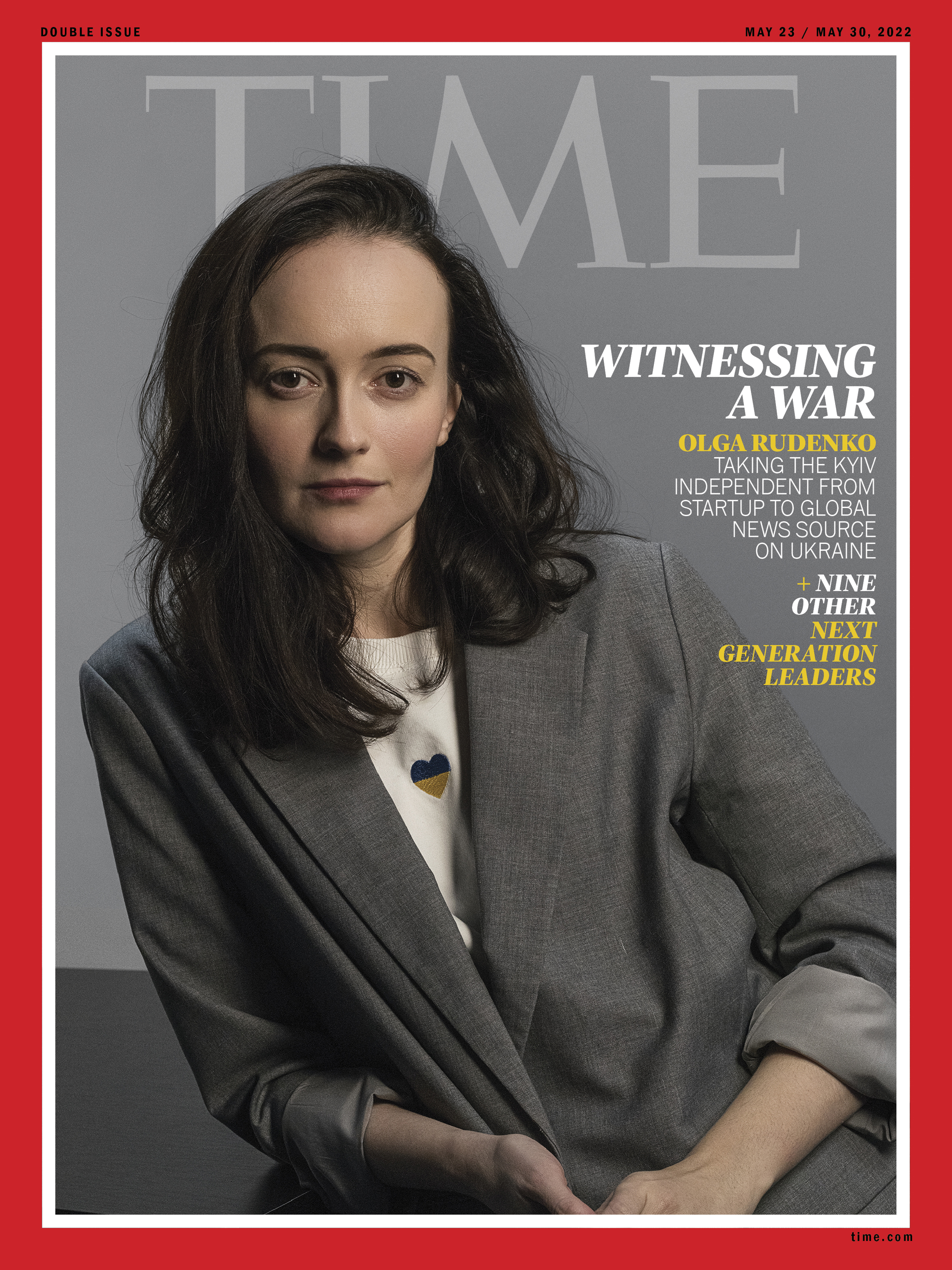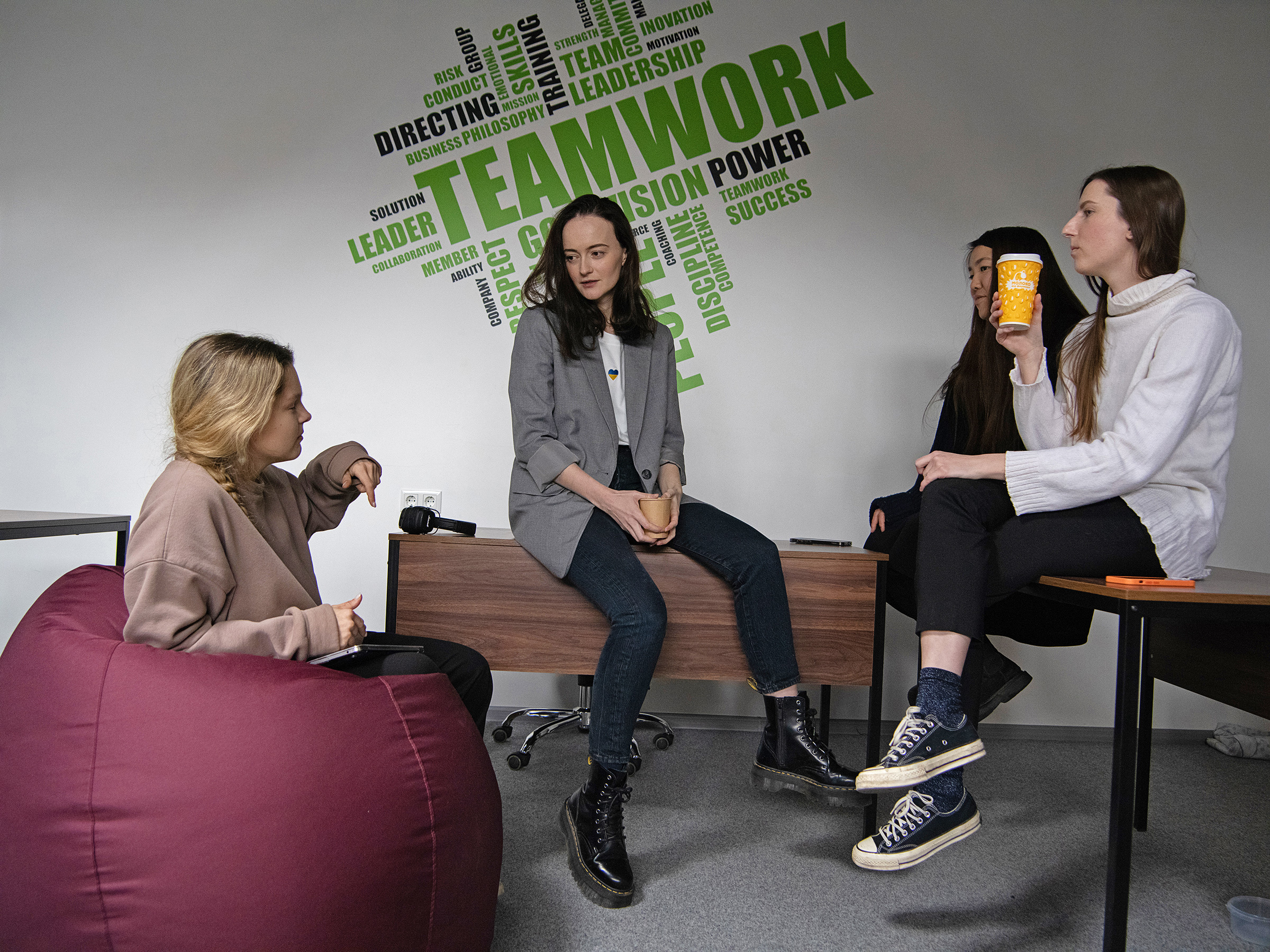The staff of the Kyiv Independent knew war was coming. They had spent long days in February reporting on an invasion that high-level sources had told them was imminent. Editor in chief Olga Rudenko and the other senior editors had consulted with the outlet’s two dozen or so staff members to make sure each had an evacuation plan and had withdrawn cash so they could keep operating if the banks closed. They had handed over passwords and instructions to contacts in North America on how to keep their website online in case their internet was knocked out. And yet as Russian President Vladimir Putin declared a “special military operation” in the early hours of Feb. 24, none of them could quite believe what was happening. “We thought they would try to take more territory in eastern Ukraine,” says Rudenko. “Not that it would be a full-fledged war.”
In the days and weeks to come, the Kyiv Independent would become the world’s primary source for reliable English-language journalism on that war. Just three days in, its Twitter following had grown from 30,000 to 1 million; it now has more than 2 million. In both its newfound influence and the widespread support it received—a crowdfunding campaign has raised nearly $2 million to keep the platform going—the transformation has been extraordinary. The Kyiv Independent had launched a mere 14 weeks before the invasion—after a scandal over journalistic independence at their previous employer inspired the editors to strike out on their own, and pulled Rudenko, who is now leading a team under exceptionally difficult circumstances, back from what was meant to be a break from journalism.
Read More: What It’s Like for Ukrainian Journalists Reporting on the War in Their Country
“We are starting this ambitious project that is based on values we really, really believe in, which is independent journalism,” Rudenko, 33, says. “And we are doing it at the same time as our country is fighting this war for survival.”
Those are high stakes for someone who never expected to be in charge. “If you saw me when I was 14 or 15, you’d never think this person would grow up to lead anything,” Rudenko says with the modesty I’ve come to expect over the course of our four conversations over the past two months. A self-professed geek with a love for books and Japanese anime, Rudenko grew up in Dnipro, in central Ukraine. After her father’s death when Olga was 4, her mother, an accountant, raised her alone and encouraged her to pursue a career in economics. But Rudenko, eager to “earn a living writing and meet interesting people,” chose to study journalism at university in Dnipro.
After an internship at a local paper, she moved to Kyiv in 2011, where she landed a job at the Kyiv Post, Ukraine’s only English-language newspaper at the time. Although the paper’s mainly international audience was relatively small, it had a reputation for doing serious journalism. “It was hardcore investigative journalism—those journalists weren’t scared of anything,” says Oleksiy Sorokin, who became a political reporter at the paper in 2018 and is now the Kyiv Independent’s political editor. “It was always going up against the establishment and those in power. The notion was that they’ve obviously done something bad, but we have to prove it.”

Buy a print of TIME’s 2022 Next Generation Leaders cover
Rudenko didn’t know about that prestige when, in 2011, she got a job as a lifestyle reporter at the paper’s recently launched Ukrainian-language website. All she knew was that she found the newsroom terrifying. Struggling to keep up with conversations in English, she felt overwhelmed. Rather than running away from her anxiety, she ran toward it. Early on, she volunteered to cover a recent opinion poll even though it would mean writing in English. She brought the piece to the editor the next day. “He opens the story in front of me and says, ‘It’s OK, I’m just going to change a few things.’” she recalls. “And then he—control A—deletes the whole story and starts writing a new one.”
She got better, and was soon writing exclusively in English, and not only about lifestyle: she also covered the 2014 Russia-backed separatist conflict in the Donbas region. In 2016, she became national editor, and by 2017, she was the deputy to the editor in chief.
With each promotion, Rudenko doubted herself—and, in fact, initially turned down the deputy job. “It was ‘Who, me?’” she says. “But when it was announced, the reaction from people was, ‘We thought you already were that.’ I realized how different my vision of myself was from how people see me.”
In 2021, Rudenko accepted a fellowship at the University of Chicago’s Stigler Center. By then she had been at the Kyiv Post for a decade—and those 10 years, coupled with rising tensions over editorial independence between the newspaper’s staff and its third owner, real estate developer Adnan Kivan, convinced her she needed to take some time to figure out her next steps. The plan was to spend the fall studying in the U.S., then return to Ukraine and simply relax for a while; she wasn’t sure she’d return to the Post.
But a major scandal at the newspaper back in Kyiv got in the way. Succumbing to pressure from Ukrainian authorities unhappy with the Post’s critical coverage, Kivan tried to appoint a more compliant editor, and when the staff refused to accept her, fired them all on Nov. 8. “It was one of the largest media scandals of the Zelensky era,” says Roman Horbyk, researcher in media and communications at Sodertorn University in Sweden. “It wasn’t the kind of thing we expected in Ukraine after 2014, and it left a bad aftertaste.”
Rudenko was in Chicago at the time, which left senior editors Toma Istomina and Sorokin to handle the fallout. They soon realized, as Sorokin puts it, “that we weren’t ready to let it go.” That night, Sorokin, Istomina, and head of investigations Anna Myroniuk called Rudenko and broke the news—and shared their decision to start something new. “Count me in,” Rudenko said.
They didn’t have a name for it yet, but on Nov. 15, the group sent out the first iteration of what would become the Kyiv Independent. Initially it was just a newsletter, but they soon added a podcast—and finally, after acquiring business partners and some grant funding, a news website. When it came time to choose an editor in chief, the solution, says Istomina, was obvious. “We all knew it was going to be Olga; she had the most experience and the complete trust of the staff. But still, being a humble person, she presented a message about how we had to have a poll first. Of course, everyone voted for her. It was almost as great as when Zelensky got 73% of the vote.”
By then, the rumble of the Russian threat was growing louder. But as they raced to figure out funding and workflows, and even while they reported on the military buildup on Ukraine’s borders, the Kyiv Independent staff were motivated by something else. “There was just this strong sense of, We need to succeed, because if we don’t, then the bad guys win,” Rudenko says, referring to the wealthy oligarchs, some linked to Putin, who influenced what appeared in the Ukrainian press. “It felt like we were defending the essence of journalism.”
Since the invasion, the nature of that defense has changed. The 24 or so reporters and editors on staff continue to turn out deeply reported stories—Rudenko ticks off several that made her proud, including one on the street cleaners and garbage collectors who continued to do their jobs even while Kyiv was being bombed, and another that followed a Ukrainian military unit as it collected the bodies of Russian soldiers. But high emotions and the relentless pace of events—to say nothing of wartime disinformation and propaganda—has made ensuring the accuracy of their reporting more challenging. “Separating the facts from opinion and emotion when your country is at war—that’s an extra difficult task.”

Rudenko has been surprised to discover previously untapped reserves in herself. “If I need to do a presentation in front of 20 people, it freaks me out,” she says, laughing. “But an audience of 2 million on Twitter does not. Both the war, and running the team—when the challenge is so big and so important, it’s like something arises in you; a coping mechanism, or some inner force that you didn’t know you had.”
Read More: The World Is Watching Russia Invade Ukraine. But Russian Media Is Telling a Different Story
That’s not to say she’s immune to the stress and trauma. A lifelong propensity for tears—great sobs she was helpless to control that would erupt whenever a kid in school was mean to her or a colleague had cross words—has suddenly dried up; with two exceptions she has not cried at all since the war started. And when she looks at an elevator selfie that she, Sorokin, and Istomina took as they left the office in the early morning of Feb. 24, not two hours before the invasion began, she no longer fully recognizes its subjects. “None of us are the same people,” she says. “We may look the same and talk to each other as usual and even joke around. But inside, we are now forever changed and traumatized by what happened two hours after that photo was taken.”
Trauma, and responsibility. Reporting from a hot spot is always voluntary for the Kyiv Independent’s staff, and Rudenko sees part of her job as reining in reporters whose enthusiasm for covering the conflict might override their better sense. Even so, in a conflict that has already killed at least 18 journalists, she can’t escape the sense that she is putting her staff in danger. “For each of them, I’ve played a scenario in my head where I have to tell their family that something happened to them, that they were taken captive, went missing or worse,” she says. “I try to not let myself go too far into that, because these thoughts are swampy and they can distract me from the work that needs to be done.”
Read More: Brent Renaud’s Death Reminds Us of the High Costs of Pursuing the Truth
To keep those thoughts at bay, she tries to picture the team together again, with the war over and their focus once again on exposing corruption and injustice. But for now, the job has given her and the rest of the staff a framework for dealing with the devastation they confront every day. “Reporting on a war in your own country is both a blessing and a curse,” she says. “It’s a curse because you can’t turn off the news. It’s your job to be looking at the atrocities, at every photo of a dead person in Bucha, every civilian killed with their hands tied behind their back, every horrible photo of a mass grave—there’s no walking away.”
But the work also provides a way of dealing with the horror—and of making meaning out of it. “As a journalist,” she says, “you have the privilege of knowing that your job is actually helping. I’m not going to say it’s helping the country or helping the troops. But you’re helping the right thing to happen.”
- Cybersecurity Experts Are Sounding the Alarm on DOGE
- Meet the 2025 Women of the Year
- The Harsh Truth About Disability Inclusion
- Why Do More Young Adults Have Cancer?
- Colman Domingo Leads With Radical Love
- How to Get Better at Doing Things Alone
- Michelle Zauner Stares Down the Darkness